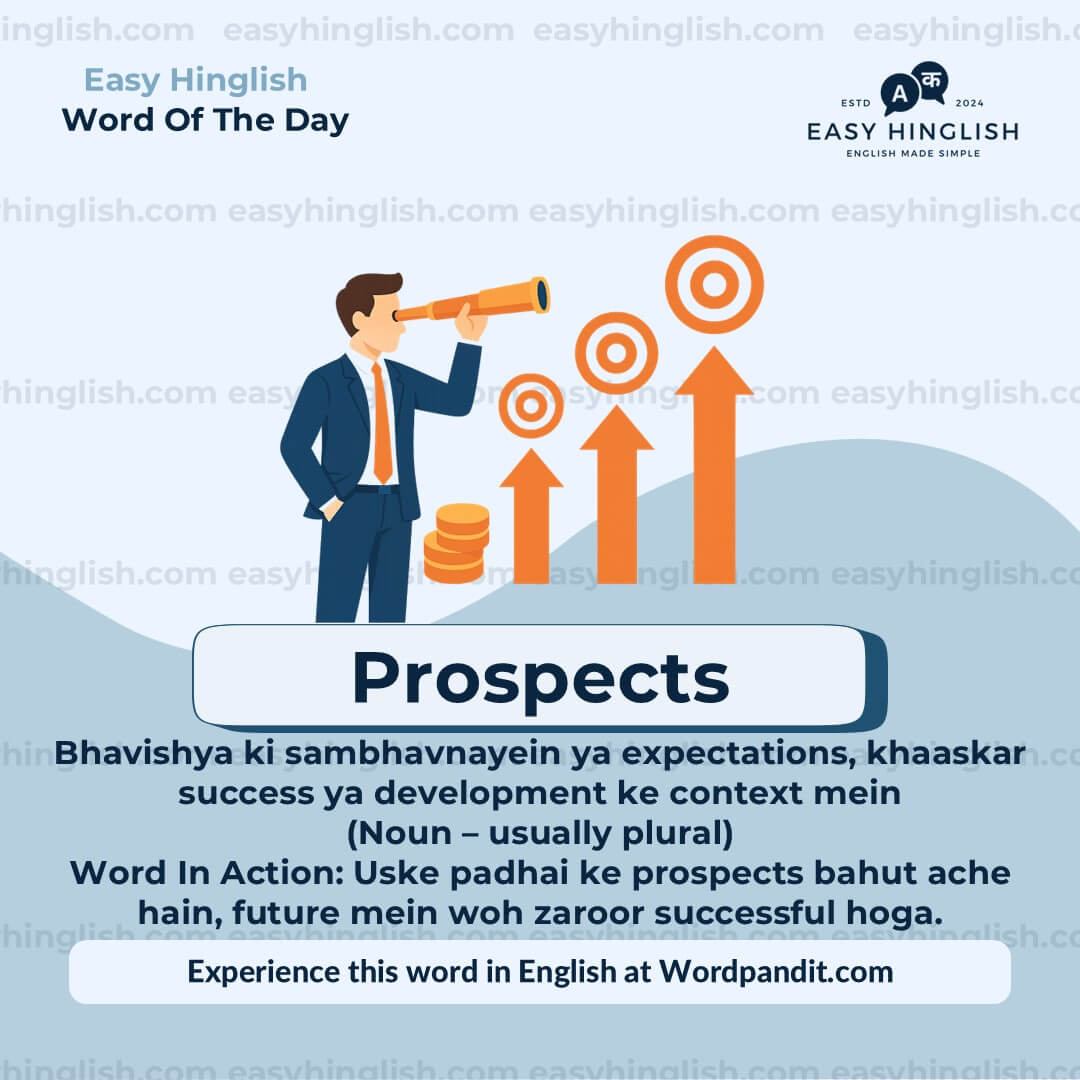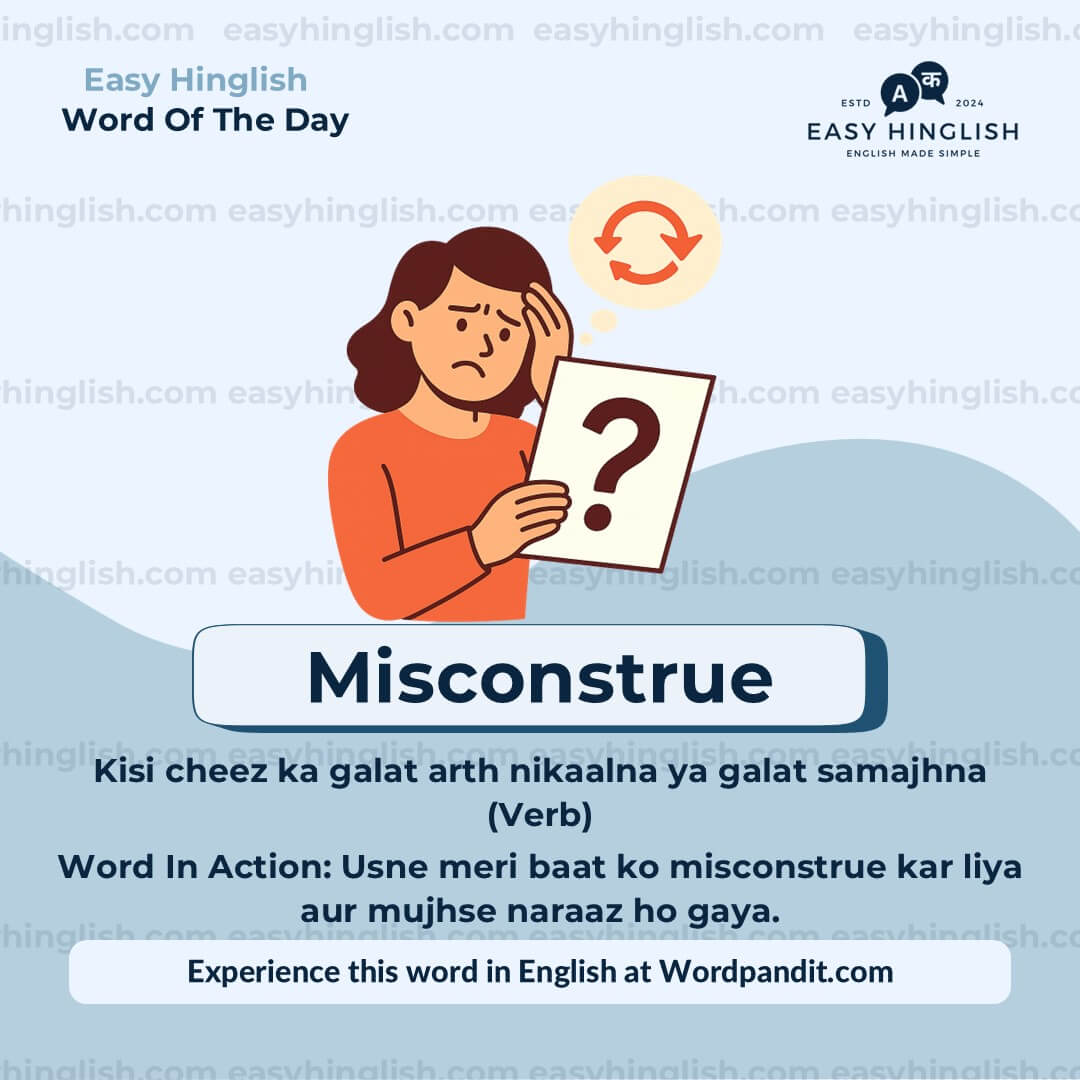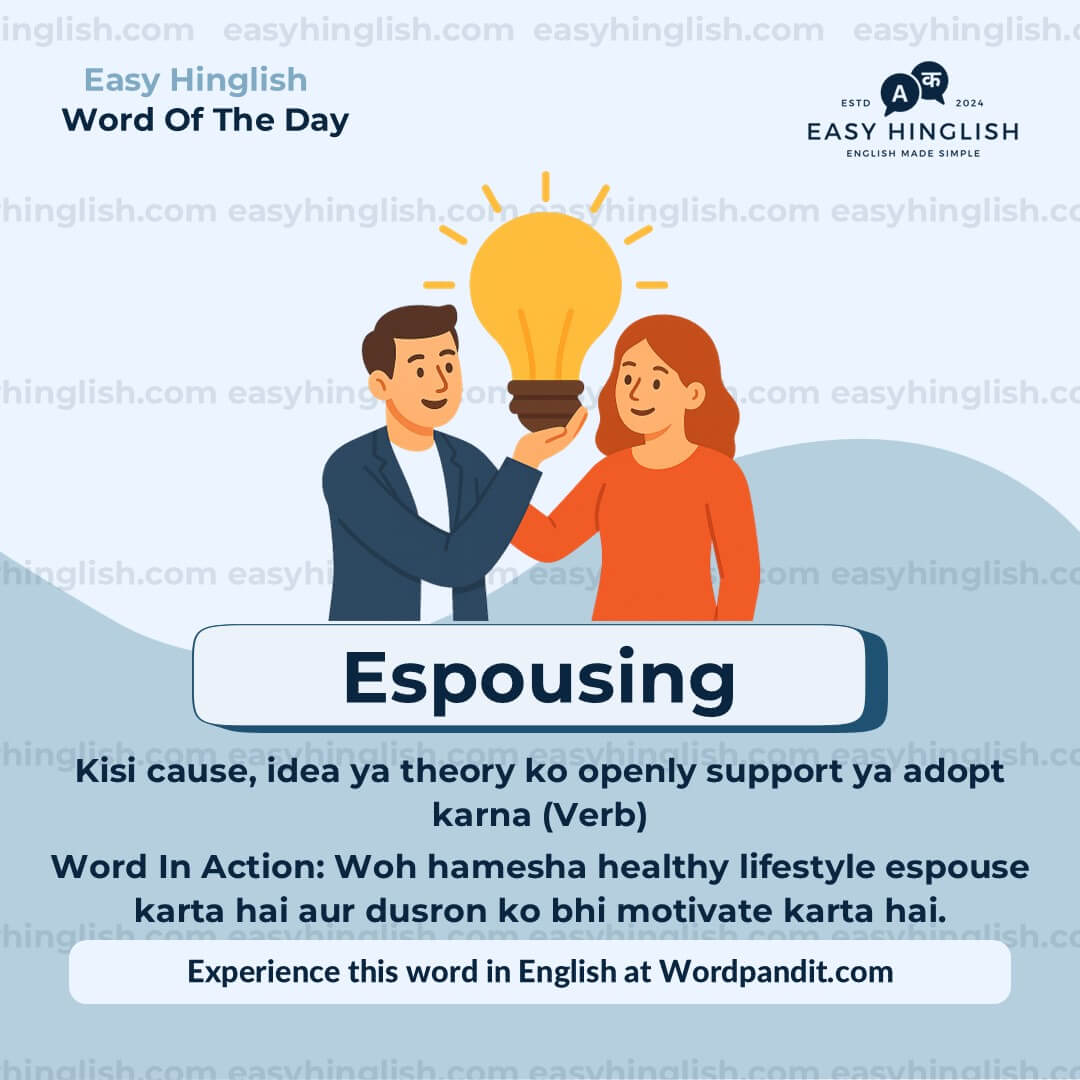Daily Vocabulary International Newspapers aur Publications se Seekho
Wordpandit ke Global Vocabulary Hub ke Saath Apni Vocabulary Expand Karo
Wordpandit par, hum aapko ek truly global vocabulary develop karne me madad karte hain, jo duniya ke sabse respected international publications se li gayi hoti hai. Yeh section aapko naye words se introduce karne ke liye design kiya gaya hai jo global conversations aur trends ko define karte hain.
Global Sources ka Power
Aapko globally sochne aur communicate karne me madad dene ke liye, hum vocabulary curate karte hain world ke top international sources se, jaise:
- The New York Times
- The Washington Post
- BBC
- The Guardian
- The Economist
- Scientific American
- Psychology Today
- Aur bhi bahut saare...
Globally Socho, Competitively Seekho
Hamare daily updates se aap international publications ke naye words seekhoge jo global news aur developments se jude hote hain. Isse aapki vocabulary current bhi rahegi aur globally relevant bhi.
Apni Global Soch Ko Expand Karo
Agar aap international exams ki tayari kar rahe ho, global business communication me excel karna chahte ho, ya sirf apni language skills improve karna chahte ho, toh Wordpandit aapko global level pe grow karne ke liye best resources provide karta hai.
Smart Learning, Global Reach
Hamari learning methodology me global examples, memory aids, aur interactive activities shamil hain, jo naye words ko effectively yaad karne aur real-world me use karne me madad karti hain.
Aaj Hi Apni Global Vocabulary Journey Shuru Karo!
Wordpandit Kyun Choose Karein?
Practical Learning: Aise words seekho jo real-world reading aur communication me aapko sach me kaam aayenge, taaki aapki comprehension aur bolne ki skills improve ho.
Diverse Content: Current affairs se lekar scientific breakthroughs tak, hamare different sources aapko multiple domains ki vocabulary seekhne ka moka dete hain.
Effortless Integration: Wordpandit ko apni daily routine ka part banao. Sirf kuch minute har din dene se aapki vocabulary time ke saath kaafi improve ho sakti hai.
Vocabulary Mastery Tak Ka Aapka Safar
- Regularly hamare Daily Vocabulary section ko visit karo
- Naye words explore karo aur unka context me use samjho
- In words ko apni writing aur bolne ki practice me use karne ki koshish karo
- Jaise-jaise aapke words badhte hain, apni progress ko track karo
Aaj Hi Apni Vocabulary Journey Shuru Karo!
Wordpandit ke saath vocabulary improve karna start karo. Roz thoda effort dalne se aap ek strong vocabulary develop kar sakte ho jo academic, professional, aur personal life me kaafi kaam aayegi.
Yaad rakho, ek naya shabd roz seekhna linguistic limitations ko door karne ka best tareeka hai! Wordpandit ko apni daily learning journey ka sathi banao aur vocabulary excellence ki taraf badho!
WORD-1: Medieval
Sandarbh (Context):
"Manifest image (temperature, respiration, lightning) or will (some of) these phenomena go the way of the unicorns, gryphons and dragons of medieval bestiaries – entities that have no place within a scientifically informed catalogue of what there is? It is this question, more than any other, that lay at the heart of Dennett’s project." - Aeon
Vyakhya (Explanatory Paragraph):
"Medieval" ka matlab hota hai Middle Ages yaani madhyakaleen yug se sambandhit. Yeh samay 5th se 15th century tak tha, jahan Europe mein castles, knights aur religious rule common the. Aaj ke zamane mein yeh word un cheezon ke liye bhi use hota hai jo purani soch ya out-dated hain. Is sentence mein "medieval bestiaries" ka matlab hai woh purani kitabein jisme mythical creatures jaise unicorns aur dragons ka zikr hota tha – jo ab science ke hisaab se imaginary maane jaate hain.
Arth (Meaning): Madhyakaleen yug se sambandhit; ya purani soch waale (Adjective)
Uccharan (Pronunciation): meh-DEE-vee-uhl
Kathinai Star (Difficulty Level): ⭐⭐
Utpatti (Etymology): Latin shabd *medium aevum* se aaya hai, jiska matlab hai "Middle Age"; English mein yeh Modern Latin *mediaevalis* se liya gaya tha 19th century mein.
Prashant Sir Ke Tathya (Prashant Sir's Notes):
"Medieval" ko hum sirf history se nahi, balki metaphor ke roop mein bhi samajh sakte hain – jaise kisi purani, bekaar ya samay ke pare concept ke liye. Especially science aur philosophy mein, is word ka use aksar purani galat soch ya concepts ko reject karne ke liye hota hai.
Samanarthi & Vipritarthi (Synonyms & Antonyms):
Samanarthi (Synonyms): archaic, old-fashioned, feudal, antiquated, ancient
Vipritarthi (Antonyms): modern, contemporary, current, up-to-date
Udaharan (Usage Examples):
- Us mahal ka design bilkul medieval lagta hai – jaise kisi purani kahani se nikla ho.
- Unki soch itni backward thi, jaise kisi medieval samay ki ho.
Sanskritik Sandarbh (Cultural Reference):
"Game of Thrones ne medieval politics aur fantasy creatures ko ek naye audience tak pahunchaya." - Popular Culture Analysis
Sochiye (Think About It):
Modern log kabhi medieval yug ko romanticize karte hain to kabhi criticize – aakhir humare time ke liye iska kya matlab hai?
Chhoti Kriya (Quick Activity):
3 aise shabd ya inventions likhiye jo aapko medieval yug se judey lagte hain, aur batayein kya woh aaj bhi relevant hain?
Yaad Karne Ka Tarika (Memory Tip):
"Medieval" = "Medi" (Middle) + "eval" (Age) → Middle Ages yaani madhyakaleen yug.
Vastavik Jeevan Me Upyog (Real-World Application):
"Medieval" ka use history, literature, architecture aur political debate mein hota hai – jab hum kisi outdated ya purani system ki baat karte hain.
WORD-2: Prospects
Sandarbh (Context):
"Different take on the prospects of intentional states was defended by Paul and Patricia Churchland. The Churchlands shared Fodor’s assumption that intentional talk attempts to capture the underlying causal structure of the mind." - Aeon
Vyakhya (Explanatory Paragraph):
"Prospects" ka matlab hota hai kisi cheez ka future mein kya potential ya sambhavnayein hain – jaise career prospects, business prospects, ya kisi idea ke successful hone ke chances. Is sentence mein, yeh word intentional states (jaise beliefs aur desires) ke future scientific explanation ke chances ko dikhata hai – kya yeh theory future mein tik paayegi ya nahi?
Arth (Meaning): Bhavishya ki sambhavnayein ya expectations, khaaskar success ya development ke context mein (Noun – usually plural)
Uccharan (Pronunciation): PRAHS-pekts
Kathinai Star (Difficulty Level): ⭐⭐
Utpatti (Etymology): Latin shabd *prospicere* se aaya hai, jiska matlab hai “aage dekhna ya nazar rakhna.”
Prashant Sir Ke Tathya (Prashant Sir's Notes):
“Prospects” ek aisa word hai jo kisi bhi idea, insaan ya situation ke future potential ko evaluate karne mein help karta hai. Philosophy mein isse kisi theory ke future viability ko judge karne ke liye use kiya jaata hai.
Samanarthi & Vipritarthi (Synonyms & Antonyms):
Samanarthi (Synonyms): outlook, potential, chances, expectations, opportunities
Vipritarthi (Antonyms): hopelessness, impossibility, doubt, stagnation
Udaharan (Usage Examples):
- Usne jab se master’s degree li hai, uske job prospects kaafi improve ho gaye hain.
- Political instability ke wajah se region ke economic prospects uncertain ho gaye hain.
Sanskritik Sandarbh (Cultural Reference):
"Middle East mein shanti ke prospects abhi bhi mushkil dikh rahe hain." – International diplomacy reports ka ek aam theme.
Sochiye (Think About It):
Aapke career ya personal life ke prospects par sabse zyada asar kis cheez ka padta hai – aapki mehnat, timing, ya environment?
Chhoti Kriya (Quick Activity):
Aapke life ke 3 areas likhiye jahan aapko positive prospects dikhte hain, aur 1 area jahan improvement ki zarurat hai – aur sochiye kyun?
Yaad Karne Ka Tarika (Memory Tip):
"Prospects" mein "spect" yaani "spectate" ya dekhna – imagine kijiye aap future ko dekh rahe hain, jisme bright chances hain!
Vastavik Jeevan Me Upyog (Real-World Application):
Business, career guidance, science ya education mein "prospects" ka use future planning aur decision-making ke liye bahut common hai.
WORD-3: Lethargy
Sandarbh (Context):
"Physical symptoms: among these possible symptoms are fatigue and lethargy; feeling achy or heavy in the body; a loss of appetite or, conversely, an urge to eat for comfort; or disrupted sleep patterns." - Psyche
Vyakhya (Explanatory Paragraph):
"Lethargy" ka matlab hota hai extreme tiredness ya energy ki kami – jab aapka mann aur sharir dono slow aur inactive feel karte hain. Iska use tab hota hai jab aap kisi kaam mein interest lose kar dete hain, ya mental/physical exhaustion face kar rahe hote hain. Upar diye gaye context mein, yeh ek aisa symptom hai jo emotional distress ya illness ke time common hota hai.
Arth (Meaning): Sharirik ya maansik thakaan ki stithi; energy ki kami (Noun)
Uccharan (Pronunciation): LEH-thur-jee
Kathinai Star (Difficulty Level): ⭐⭐⭐
Utpatti (Etymology): Latin *lethargia* aur Greek *lēthargia* se aaya hai, jiska matlab hai “inactive ya bhoolne wali stithi”, jisme *lēthē* (forgetfulness) aur *argos* (idle) shamil hain.
Prashant Sir Ke Tathya (Prashant Sir's Notes):
Lethargy sirf tiredness nahi hai – yeh ek gehri thakaan hoti hai jo aapke motivation aur daily activities dono ko affect karti hai. Health, psychology aur emotional writing mein iska use kaafi common hai.
Samanarthi & Vipritarthi (Synonyms & Antonyms):
Samanarthi (Synonyms): fatigue, sluggishness, drowsiness, weariness, inertia
Vipritarthi (Antonyms): energy, vitality, alertness, liveliness, enthusiasm
Udaharan (Usage Examples):
- Lambi flight ke baad usko ek ajeeb si lethargy mehsoos hui – jaise body hi shut ho gayi ho.
- Garmi ke mausam mein sabhi mein lethargy ka ek mood aa jaata hai – sab kuch dheere chalne lagta hai.
Sanskritik Sandarbh (Cultural Reference):
"The Lethargy of Distance" ek biography ka naam hai historian Manning Clark ke upar, jahan word ka use emotional aur national suustpan ko dikhane ke liye hua hai. - Australian literary reference
Sochiye (Think About It):
Humare rozmarra ke jeevan mein lethargy ke kya kya kaaran ho sakte hain – aur kaise hum unka samadhan nikaal sakte hain?
Chhoti Kriya (Quick Activity):
Tin aise situations likhiye jahan aapne lethargy feel ki ho. Har ek mein ek chhoti si change likhiye jo aapke energy level ko badha sakti hai.
Yaad Karne Ka Tarika (Memory Tip):
"Lethargy" = "Lethal to Energy" – yaani yeh word uss haalat ko batata hai jo aapki energy ko maar deta hai.
Vastavik Jeevan Me Upyog (Real-World Application):
Lethargy ko pehchaanna health aur self-care ke liye zaroori hai. Yeh burnout, illness ya emotional strain ka signal ho sakta hai – jiska timely response zaroori hota hai.
WORD-4: Misconstrue
Sandarbh (Context):
"In his view, both approaches are guilty of a common failing: they misconstrue the point of intentional-state talk. Drawing on the work of his mid-century heroes – most notably Ryle – Dennett argued that we appeal to beliefs, desires and intention." - Aeon
Vyakhya (Explanatory Paragraph):
"Misconstrue" ka matlab hota hai kisi baat ya intention ko galat tarike se samajhna ya interpret karna. Jab hum kisi ke words, actions ya emotions ko galat samajh lete hain, to misunderstanding ya conflict ho sakta hai. Is context mein, author keh raha hai ki dono philosophical approaches ne "intentional-state talk" ka maksad galat samjha — yaani unhone uska matlab hi ulta nikaal liya.
Arth (Meaning): Kisi cheez ka galat arth nikaalna ya galat samajhna (Verb)
Uccharan (Pronunciation): miss-kun-STROO
Kathinai Star (Difficulty Level): ⭐⭐⭐
Utpatti (Etymology): Middle English se liya gaya hai: “mis-” (galat) + “construe” (interpret karna); Latin *construere* se, jiska matlab hai “build ya arrange karna.”
Prashant Sir Ke Tathya (Prashant Sir's Notes):
“Misconstrue” ka use formal ya academic settings mein hota hai – jab koi kisi important concept ya law ko galat samajhta hai. Iska use essay writing ya discussions mein karna aapki vocabulary ko classy banata hai. Dhyan rahe, yeh sirf confusion nahi, balki damaging misinterpretation dikhata hai.
Samanarthi & Vipritarthi (Synonyms & Antonyms):
Samanarthi (Synonyms): misinterpret, misunderstand, misread, distort, misjudge
Vipritarthi (Antonyms): interpret, understand, perceive correctly, grasp
Udaharan (Usage Examples):
- Usne uski chup ko narazgi samjha, par asal mein woh bas soch mein dooba hua tha — usne uski feelings ko misconstrue kar diya.
- Media aksar scientific research ko sensational headlines ke liye misconstrue kar deta hai.
Sanskritik Sandarbh (Cultural Reference):
"Sabse badi communication problem yeh hai ki hum samajhne ke liye nahi, sirf jawab dene ke liye sunte hain — ya phir hum baat ko misconstrue kar dete hain." — Inspired by Stephen R. Covey
Sochiye (Think About It):
Log aksar doosron ki baat ya intention ko misconstrue kyun karte hain? Kya hum empathy aur active listening se is problem ko kam kar sakte hain?
Chhoti Kriya (Quick Activity):
Ek chhoti si line likhiye jo galat samjhi ja sakti hai. Phir usi line ko clarity ke saath dobara likhiye. Dekhiye dono mein kya farq hai.
Yaad Karne Ka Tarika (Memory Tip):
“Misconstrue” = “mis-” (galat) + “construe” (interpret) → yaani galat matlab nikaal lena. Socho: "Missed the true meaning."
Vastavik Jeevan Me Upyog (Real-World Application):
Law, media, diplomacy aur daily conversations mein "misconstrue" ek useful word hai – jab bhi kisi ne kisi baat ka galat matlab nikaal liya ho, tab iska use apt hota hai.
WORD-5: Espousing
Sandarbh (Context):
"Some theorists consider Dennett as espousing eliminativist views about consciousness – making him a ‘consciousness denier’, as Galen Strawson once put it in The New York Review." - BBC
Vyakhya (Explanatory Paragraph):
"Espousing" ka matlab hota hai kisi vichar, siddhant, ya theory ko puri tarah se adopt ya support karna – jaise kisi cause ke saath jud jaana. Yeh word usually un situations mein use hota hai jahan koi vyakti apne aap ko kisi ideological ya intellectual stance ke saath openly associate karta hai. Is sentence mein, Dennett ko consciousness ke ek controversial view ko espouse karte hue bataya gaya hai — yaani woh actively uss idea ko support karte hain.
Arth (Meaning): Kisi cause, idea ya theory ko openly support ya adopt karna (Verb)
Uccharan (Pronunciation): es-POW-zing
Kathinai Star (Difficulty Level): ⭐⭐⭐
Utpatti (Etymology): Old French *espouser* aur Latin *sponsare* se aaya hai, jiska matlab hota hai “shaadi ka vaada karna”; baad mein iska arth bana “kisi vichar se commitment.”
Prashant Sir Ke Tathya (Prashant Sir's Notes):
"Espousing" ka use jab hota hai to samajh jao ki baat kisi deep ya formal support ki ho rahi hai — jaise academic ya political stance lena. Yeh word casually kisi like/dislike ke liye nahi use hota, balki jab aap kisi idea se publicly aur ideologically jud jaate hain.
Samanarthi & Vipritarthi (Synonyms & Antonyms):
Samanarthi (Synonyms): advocate, support, embrace, promote, champion
Vipritarthi (Antonyms): reject, oppose, denounce, disavow, repudiate
Udaharan (Usage Examples):
- Woh har speech mein progressive values ko espouse karti hai — aur logo ko inspire karti hai.
- Scientist ko criticize kiya gaya kyunki usne ek aisi theory ko espouse kiya jo purani research se contradict karti thi.
Sanskritik Sandarbh (Cultural Reference):
“Gandhiji ne non-violence ko sirf ek tactic nahi, balki jeevan jeene ka ek tareeka bana kar espouse kiya.” – Indian independence ka ek central theme
Sochiye (Think About It):
Aap apne daily life mein kis vichar ya principle ko espouse karte ho – aur kya aapka behavior us vichar ko sach mein reflect karta hai?
Chhoti Kriya (Quick Activity):
"I espouse the idea that..." se ek sentence likhiye aur uske peeche ka logic ek aur sentence mein explain kijiye.
Yaad Karne Ka Tarika (Memory Tip):
"Espousing" mein "spouse" chhupa hai — jaise shaadi mein commitment hoti hai, waise hi kisi idea se commitment dikhata hai yeh word.
Vastavik Jeevan Me Upyog (Real-World Application):
"Espousing" ka use academic writing, political debate aur journalism mein hota hai jab log kisi theory, ideology ya movement ka public support karte hain.













